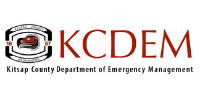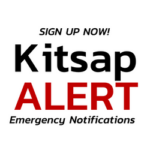Disasters impact everyone in Kitsap County. But, emergencies affect people with access and functional needs more than others. Whether you are a caretaker or someone who lives with special considerations, making a plan and knowing what to do is important.

Key Considerations
Please note, in the event of a large disaster, local governments and social service organizations will be limited in their ability to respond to the level of human need generated. Below are some recommendations and sources to help individuals and families prepare for a disaster. Use this information as a starting point for those with access and functional needs:
Get Informed
Learn which area threats and hazards are most likely to happen where you live, work, and play. Plan accordingly. Kitsap County is at high risk for a major earthquake. Yet, floods, landslides, and severe weather are more common and could have more impact in daily lives.
Make a Plan
Preparedness is not a one-size-fits-all activity. Each individual and household should adapt plans according to their situation. Some considerations for emergency preparation are:
- Create a support network. Keep a contact list in a watertight container in your emergency kit.
- Inform your support network where you keep your emergency supplies.
- Register with Community Connect. It is a free, secure, and easy way for Kitsap residents to provide critical information about household members to our first responders in a sudden emergency .
- Wear medical alert tags or bracelets.
- If you have a communication disability, make sure your emergency information states the best way to communicate with you.
- Plan how you will communicate with others if your equipment is not working. Include laminated cards with phrases, pictures or pictograms.
- Keep Braille/text communication cards close by if used for two-way communication.
- Be ready to explain to first responders the equipment and supplies you need if you need to evacuate.
- If you use an augmentative communications device or assistive technologies, plan how you will evacuate with the devices. In case equipment is lost or destroyed, keep model numbers and a note on how it was secured – Medicaid, Medicare, private insurance, etc.
- Plan ahead for accessible transportation. Become familiar with Kitsap Transit’s access guidelines.
- If you use medical equipment in your home that uses electricity there may ways you can prepare for its use during a power outage. Talk to your health care provider to find out if you can use a battery powered backup power supply.
- If you are dependent on dialysis or other life-sustaining treatment, know the location and availability of more than one facility.
- Prepared tips are available for those with diabetes.
- Use this online tool from the U.S. Department of Health and Human Services to locate and access electronic health records from a variety of sources.
- Planning is especially important for those caring for children with disabilities or those who support individuals who have difficulty in unfamiliar or chaotic environments. See the Helpful Links section below for ideas.
Adapted from Ready.Gov. For more, visit Ready.Gov.
Besides basic survival supplies, your emergency supplies should have items to meet individual needs in various emergencies. Consider the items used on a daily basis and which ones you may need to add to your supplies.
For more on what to include for those who are:
- deaf and hard of hearing
- blind or have low vision
- those with a speech disability
- those with mobility considerations
- those with a sensory disability
Please visit Ready.Gov and review recommended items for each case.
Get Help
Kitsap County uses Functional Assessment Service Teams to help people with access and functional needs during emergencies, including children with special needs. Email KCDEM for more details.
Severe Weather Shelters run by the Kitsap County during periods of sustained cold weather from November through March are compliant with the Americans with Disabilities Act (ADA). Cooling stations established by KCDEM for extreme heat conditions will also be ADA compliant.
Learn
KCDEM is once again scheduling public presentations on disaster preparedness. Visit our Speakers Bureau to schedule a presentation. Also, KCDEM will be scheduling regular classes on topics of interest to the general public in the near future. See our events calendar for details.
KCDEM News
Flood Declaration issued for Point No Point
The area is unsafe. Vehicles could damage the roadway. Please do not visit the area during this emergency. Flood footage via Darren Gurnee on Youtube. Point No Point County Park [...]
Special EMC Meeting 10/20 Notice & Agenda
EMC Meeting Notice 10.20.2022 - EM Council Agenda 20th October 2022 The Kitsap County Emergency Management Council (EMC) Special Meeting will be held on Thursday, October 20, 2022 from 9:30AM-10:30AM* Topic: Appointment of an [...]
EMC Meeting 09.06.2022 Meeting Notice & Agenda
Meeting Notice 09.06.2022 - EM Council Agenda 6th September2022 EMC Meeting Packet 09.06.2022 - final September 2, 2022 The Kitsap County Emergency Management Council (EMC) Special Budget Meeting will be held on Tuesday, September [...]
Upcoming Events
Helpful Links
- Coalition on Inclusive Emergency Planning
- Disability and Health Emergency Preparedness (source: CDC)
- Preparing Individuals with Disabilities (source: Ready.Gov)
- Preparing Children with Special Needs for Disasters (source: American Academy of Pediatrics)
- Emergency Preparedness for Children with Special Needs (source: Seattle Children’s Hospital)
- Special Considerations for Individuals (source: King County MakeItThrough)





